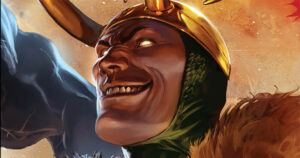
In my previous blog posts, The Evolution of Loki: From Villain to Anti-Hero and Loki’s Role in Ragnarok: Mythology vs. Marvel, we explored Loki’s complex development as both a villain and a misunderstood anti-hero. Today, we dive into a more specific aspect of Loki’s character—his deceptions. Marvel’s Loki, much like his mythological counterpart, is known for his clever tricks and manipulation. However, in the comics, his schemes have often been grander and more far-reaching, impacting not just the gods of Asgard but the entire Marvel Universe. Here, we’ll explore some of Loki’s most memorable and clever schemes throughout Marvel Comics, showing how his trickster nature has defined much of his character arc.
Loki’s debut in Marvel Comics is nothing short of spectacular. Introduced in Journey into Mystery #85, Loki showcases his knack for manipulation right from the get-go. Escape from imprisonment marks his dramatic entrance, setting the tone for his future antics.
This post contains affiliate links. If you make a purchase through these links, I may earn a commission at no extra cost to you.
Loki’s First Deception: A Master of Manipulation
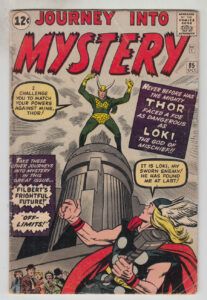 Loki’s journey into villainy begins with his very first appearance in Journey Into Mystery #85 (October 1962), written by Stan Lee with art by Jack Kirby. In this issue, Loki emerges as Thor’s adoptive brother and sworn enemy. From the very start, Loki’s motivation is clear—he is jealous of Thor and wants nothing more than to see him fall. One of Loki’s earliest schemes involves turning humans against Thor by manipulating events from behind the scenes.
Loki’s journey into villainy begins with his very first appearance in Journey Into Mystery #85 (October 1962), written by Stan Lee with art by Jack Kirby. In this issue, Loki emerges as Thor’s adoptive brother and sworn enemy. From the very start, Loki’s motivation is clear—he is jealous of Thor and wants nothing more than to see him fall. One of Loki’s earliest schemes involves turning humans against Thor by manipulating events from behind the scenes.
This initial act of deceit establishes Loki’s role as a master manipulator, adept at orchestrating conflicts without direct confrontation. By convincing beings more powerful and formidable to do his bidding, Loki starts to carve out his reputation as a trickster who prefers brains over brawn.
Stan Lee, in crafting Loki, wanted to showcase a villain whose power came not just from brute force but from his wit. Loki uses his magic to free himself from his imprisonment and immediately sets out to trick Thor into a trap. His cleverness here isn’t just in the strength of his magical abilities, but in how he manipulates others to do his bidding. This early scheme would set the tone for Loki’s career as a master manipulator, always several steps ahead of his enemies. His tactics are driven by his intellect and sharp cunning, making him a villain that relies on manipulation rather than direct confrontation.
This act also lays the groundwork for understanding how Loki’s schemes often weave chaos and complexity into the Marvel Universe. His ability to bend others to his will without revealing his hand makes him a compelling and often unpredictable antagonist.
The Creation of the Avengers (Avengers #1)
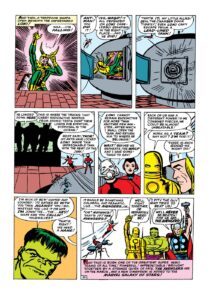 One of Loki’s most notable schemes inadvertently shaped the entire Marvel Universe. In Avengers #1 (September 1963), written by Stan Lee and illustrated by Jack Kirby, Loki’s plan to trick the Hulk into a destructive rampage was supposed to lure Thor into a trap. This scheme is a masterclass in how Loki uses others as pawns to achieve his ends.
One of Loki’s most notable schemes inadvertently shaped the entire Marvel Universe. In Avengers #1 (September 1963), written by Stan Lee and illustrated by Jack Kirby, Loki’s plan to trick the Hulk into a destructive rampage was supposed to lure Thor into a trap. This scheme is a masterclass in how Loki uses others as pawns to achieve his ends.
However, the unexpected consequence of this particular ploy was monumental. Instead of merely inconveniencing Thor, Loki’s actions led to the formation of the Avengers. Hulk’s rampage caught the attention of other heroes—Iron Man, Ant-Man, and Wasp—who, along with Thor, united to confront the menace. The result was the creation of the Avengers, one of the most influential superhero teams in comic book history.
Loki’s manipulation here is a double-edged sword. On one hand, it showcases his capability to instigate events that cause widespread chaos. On the other hand, it underscores the unpredictability of his schemes. While he sought to weaken Thor, he inadvertently strengthened Thor’s alliances and bolstered the forces of good in the Marvel Universe. In a previous post about the philosophy of Marvel Comics, we discussed how over-confidence and reality play a big part in the stories. This is definitely evident here as the Avengers come together as an unforeseen consequence of Loki’s scheming.
This episode is a powerful reminder of Loki’s far-reaching influence. Even his failures can lead to significant developments. For readers and fans, it highlights the importance of looking at the broader impact of Loki’s schemes—not just the immediate results. Understanding this can provide a deeper appreciation of his role in the Marvel mythos and underscore the intricate relationship between his actions and their fallout.
The Eternal Rivalry: Swapping Thor and Loki’s Lives (Thor #179)

Loki’s long-standing rivalry with Thor reaches new heights in Thor #179 (August 1970), written by Stan Lee and illustrated by Jack Kirby. Using his mastery of sorcery, Loki devises a plan to switch bodies with Thor. His goal? Rule Asgard in Thor’s powerful and respected form, effectively sidestepping his own cursed reputation.
This body swap scenario reveals much about Loki’s character. Driven by envy and a thirst for power, Loki believes that Thor’s body will provide the respect and authority he craves. However, even in Thor’s form, Loki underestimates the strength of Thor’s spirit and heroism. Despite Loki’s intentions, Thor’s inherent heroism and the love of those around him ultimately break through the deception, returning the brothers to their true selves.
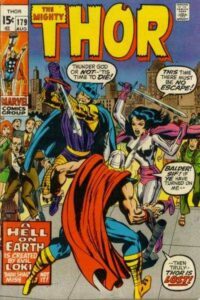 This scheme is a fascinating glimpse into Loki’s psyche. His willingness to go to extreme lengths to uproot Thor indicates his persistent obsession with overshadowing his brother. It also underscores a recurring theme in Loki’s actions—the belief that power and respect can be achieved through trickery and deception rather than true heroism.
This scheme is a fascinating glimpse into Loki’s psyche. His willingness to go to extreme lengths to uproot Thor indicates his persistent obsession with overshadowing his brother. It also underscores a recurring theme in Loki’s actions—the belief that power and respect can be achieved through trickery and deception rather than true heroism.
The fallout from this scheme reinforces the unbreakable bond between Thor and Loki. Despite the deception and rivalry, the two brothers are inextricably linked, their fates intertwined. For readers and fans, this storyline elucidates the depth of Loki’s cunning and the resilience of Thor’s heroism, adding layers to their dynamic relationship.
The Surtur Scheme: Manipulating Fire and Ice (The Mighty Thor #340-353)
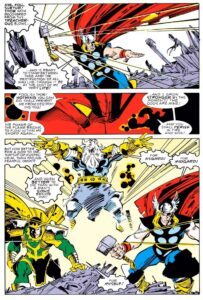
In Walt Simonson’s The Mighty Thor #340-353, Loki once again plays a crucial role in manipulating larger cosmic forces. In another bold move, Loki aligns himself with Surtur, the formidable Fire Demon of Muspelheim, aiming to leverage this alliance for his own gain. Yet, true to his trickster nature, Loki also plans to betray both Surtur and Asgard, hoping to emerge victorious regardless of who wins. This scheme underscores Loki’s skill in playing all sides, a hallmark of his often duplicitous strategies.
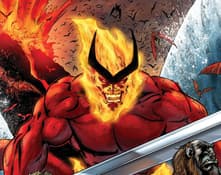
The intricacy of this plot is a testament to Loki’s tactical mind. By allying with Surtur, Loki gets a chance to overthrow Thor and the ruling order of Asgard. In parallel, he maneuvers to ensure that Surtur does not come out on top either. Loki’s plan is to position himself as the ultimate power broker, one step ahead of everyone else.
Yet, despite his elaborate scheming, Loki’s ultimate goal of seizing power for himself is consistently thwarted by the very nature of his allies and enemies. The unpredictability of cosmic forces like Surtur makes this a high-stakes game, revealing the inherent risks in Loki’s ambitious plans. Loki’s manipulation of these forces showcases his ability to navigate complex cosmic dynamics for personal gain, but also illustrates the tenuous balance he must maintain.
For readers, this storyline serves as a captivating exploration of Loki’s ability to manipulate and scheme on a grand scale. Understanding the intricacies of Loki’s alliances and betrayals sheds light on his complex character—ever the strategist, always weaving through layers of deception.
Acts of Vengeance: Loki’s Villainous Alliance (1989-1990)
Loki’s ability to orchestrate chaos takes center stage in the Acts of Vengeance crossover event. This event took the talents of two dozen of Marvel’s top writers to bring together forty superheroes against at least as many super villains. This could arguably be Loki’s greatest appearance in Marvel Comics, so we are going to look at it in more detail.
The Acts of Vengeance crossover event, spanning from December 1989 to February 1990, was one of Loki’s most elaborate schemes in the Marvel Universe. Orchestrating a secret alliance of supervillains, Loki manipulates these characters into attacking heroes they don’t usually face, leading to a series of unexpected and chaotic battles. The storyline cuts across multiple titles and showcases Loki’s unparalleled ability to influence and deceive both his allies and enemies.
As an Amazon Associate, I earn from qualifying purchases.
Purchase your own copy of The Acts of Vengeance

The Setup
The main arc begins with Avengers #311-313, published between December 1989 and January 1990, written by John Byrne with artwork by Paul Ryan. Loki, hidden from view, brings together some of Marvel’s most notorious villains—Dr. Doom, Magneto, Kingpin, Red Skull, and the Mandarin—convinced that if they switched their usual superhero adversaries, they would stand a better chance of defeating them. The villains are unaware that it is Loki pulling the strings, as he manipulates events from behind the scenes.
Loki’s plan revolves around the idea of exploiting the unpredictability of unfamiliar matchups. By attacking heroes they don’t normally face, the villains hope to capitalize on the heroes’ lack of preparation. For example, in Amazing Spider-Man #326-329 (December 1989 – February 1990), written by David Michelinie and illustrated by Erik Larsen, Spider-Man faces off against Magneto, a villain he’s never encountered before. This tactic is repeated across multiple storylines and titles, creating chaos across the Marvel Universe.
The Deception
In Avengers Spotlight #26-29 (December 1989 – February 1990), written by Howard Mackie with art by Al Milgrom, Loki reveals his grand scheme to the reader, showing how he had manipulated Earth’s mightiest villains for his own amusement. Throughout the event, he encourages the villains to target the Avengers, X-Men, and other key heroes, all while keeping his own identity hidden from them.
The Conflict Intensifies
One of the most significant battles occurs in Avengers #312, published in December 1989, where Loki’s manipulations cause an alliance of supervillains to attack Avengers headquarters. The storyline intensifies in Avengers West Coast #55-57 (January-March 1990), written by John Byrne, where the West Coast Avengers team faces down an onslaught of villainous threats orchestrated by Loki.
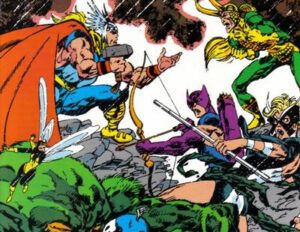
Meanwhile, in Thor #411-412 (December 1989 – January 1990), written by Tom DeFalco and penciled by Ron Frenz, Loki is finally revealed as the mastermind behind the Acts of Vengeance event. This revelation comes during Thor’s battle with the Juggernaut, one of Loki’s pawns in his broader scheme. The storyline shows Loki’s unyielding desire to bring down his brother Thor and the gods of Asgard by causing chaos on Earth.
Loki’s Downfall
Loki’s master plan begins to unravel in Avengers #313 (January 1990), where the heroes start to piece together the true nature of the attacks. As they track the source of the villainous alliance, Loki is finally exposed. Despite all his efforts, his plan ultimately backfires, as the heroes band together and overcome the unfamiliar threats. The Acts of Vengeance event concludes in Avengers #314-315 (February-March 1990), written by John Byrne and drawn by Paul Ryan, where Loki’s manipulations come to light, and he is confronted by the heroes he sought to destroy.
A Lasting Legacy
Though Loki’s scheme fails, Acts of Vengeance highlights his strategic mind and ability to play both sides to his advantage. The event solidifies Loki as one of Marvel’s greatest masterminds, capable of orchestrating a complex web of alliances and deceptions on a grand scale. Moreover, the series spanned across many titles including Captain America, Iron Man, X-Men, Daredevil, and more, making it one of the most ambitious crossovers of its time.
The key writers and artists involved in the event are John Byrne (Avengers, Avengers West Coast), David Michelinie (Amazing Spider-Man), Erik Larsen (Amazing Spider-Man), Tom DeFalco (Thor), and Ron Frenz (Thor). Their collaboration, alongside other Marvel creators, made Acts of Vengeance a multifaceted event that showcased Loki’s manipulative genius.
One of the standout aspects of this scheme is Loki’s skill in managing egos and motivations. Coordinating such a diverse group of villains is no small feat, but Loki successfully aligns their interests without revealing his hand. This level of covert manipulation showcases his deep understanding of psychological warfare.
For readers, this storyline reveals Loki’s capacity to create large-scale disruption without direct confrontation. His preference for subtlety over brute force distinguishes him from many other villains. This deceptive approach expands his influence far beyond Asgard, challenging multiple heroes simultaneously.
Understanding Loki’s role in Acts of Vengeance provides deeper insight into his strategic mind. It serves as a reminder that true power often lies in the ability to pull strings from behind the scenes. This section encourages readers to appreciate the intricacy of Loki’s tactics and the far-reaching impact of his schemes.
For more information on Acts of Vengeance crossover, take a look at this video from The Marvelous Wave:
The Siege of Asgard: Playing Both Sides (Siege #1-4, January–May 2010)
Loki’s manipulative prowess reaches a peak during the Siege event, where he orchestrates a devastating attack on Asgard, now situated on Earth. This four-issue limited series, written by Brian Michael Bendis and illustrated by Olivier Coipel, ran from January to May 2010 and marks a pivotal moment in Loki’s ever-evolving relationship with Thor, Asgard, and the wider Marvel Universe. By influencing Norman Osborn and the Cabal, Loki sets into motion a series of events meant to bring about the fall of Asgard.
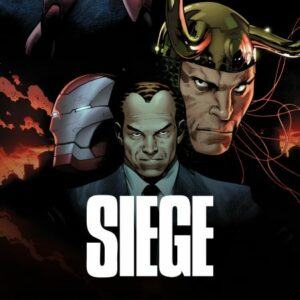
In Siege, Loki takes advantage of the fragile state of Asgard, which has been relocated to Earth following the events of Thor: Ragnarok and Dark Reign. Loki cleverly manipulates Norman Osborn, the leader of H.A.M.M.E.R. and head of the “Dark Avengers,” convincing him that destroying Asgard will cement Osborn’s power. Loki plants the idea of an invasion, using Osborn’s insecurities and desire for control to push him towards a full-scale attack on the city of the gods.
As Osborn’s forces lay siege to Asgard, Loki operates in the shadows, ensuring that both sides are at each other’s throats. His ultimate goal is not the destruction of Asgard itself, but rather the chaos that would result from such an attack—chaos in which Loki thrives. Throughout this arc, Loki’s schemes are multi-layered. He initially sides with Osborn but later betrays him by using the Norn Stones to empower the Avengers, including Thor, in the climactic battle. This moment of betrayal reflects Loki’s unpredictable nature, showing that even when he appears to choose a side, it is always for his own mysterious ends.
This scheme, however, reveals a more complex facet of Loki’s character. While initially driven by his typical desire for chaos and power, Loki begins to show signs of remorse. As the destruction of Asgard unfolds, Loki’s conscience starts to weigh on him, leading to an unexpected turn. In a rare moment of vulnerability, Loki sacrifices himself to save Thor and the remaining Asgardians.
The fallout from the Siege event highlights Loki’s evolving motivations. What started as another cunning plot transformed into a turning point in his journey from villainy to a more nuanced, anti-heroic role. This shift is significant, illustrating how deeply internal conflicts and shifting priorities can alter one’s actions and identity.
For readers, the Siege event offers a gripping examination of character evolution. Loki’s shift from a purely self-serving trickster to someone capable of self-sacrifice adds depth to his persona. It encourages fans to reflect on the nature of redemption and the potential for change, even in the unlikeliest of figures.
Loki’s Rebirth: The Young Avenger (Journey into Mystery #622-645)
Loki’s most dramatic transformation comes in Journey Into Mystery #622-645 (June 2011–October 2012), written by Kieron Gillen and illustrated by Doug Braithwaite. In this storyline, Loki is reborn as a child following his death during Siege. Kid Loki, as he’s called, is a far more innocent and vulnerable version of the character, lacking the baggage of his past deceptions.

Kieron Gillen crafted this version of Loki as a character yearning for redemption. Though Kid Loki still possesses a mischievous streak, he wants to be more than the villain he was in his past life. Yet, as Gillen has often discussed, Loki can never fully escape who he is, and his past always looms large. Kid Loki’s arc is tragic because, despite his best efforts to be good, the memories of his former self eventually return. In the end, Loki sacrifices his innocence to save the world, proving that no matter how much he wants to change, he remains bound by his nature. This rebirth offers a fresh take on Loki, demonstrating the ongoing complexity and depth of the trickster god. Fans witness his journey towards self-discovery and the conflicts that come with trying to change one’s inherent nature.
For readers, this arc is a rich exploration of themes like transformation, identity, and the possibility of redemption. It allows fans to see Loki in a different light, as someone capable of growth and change. This storyline encourages a deeper understanding of the complexities within Loki, moving beyond the simple labels of villain or hero to appreciate his multi-faceted persona.
Loki’s Ultimate Scheme: Becoming Sorcerer Supreme (Doctor Strange #381-385)
One of Loki’s boldest and most cunning plots unfolded in Doctor Strange #381-385, written by Donny Cates and illustrated by Gabriel Hernández Walta, with a cover date spanning December 2017 to April 2018. This storyline, titled “Loki: Sorcerer Supreme,” marks a significant shift for both the God of Mischief and the Marvel Universe’s mystical landscape.
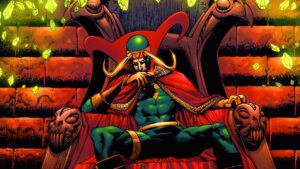
In this arc, Loki takes on the mantle of Sorcerer Supreme after seemingly winning the title in a mysterious contest. With Doctor Strange’s powers diminished, Loki steps into his role as Earth’s protector of magic—though his motivations, as always, are far more sinister. His goal is to locate and control a powerful spell known as the Exile of Singhsoon, which can grant ultimate power over magic.
Loki’s reign as Sorcerer Supreme begins with him acting as though he truly wants to protect the world, adding an extra layer of complexity to his character. While he battles mystical threats and tries to maintain order, he constantly teases Doctor Strange, who is working as a veterinarian in the meantime, biding his time and scheming to reclaim his title. The true depth of Loki’s deception reveals itself as the story progresses—his pursuit of the Exile of Singhsoon could rewrite the laws of magic itself, an alluring prospect for someone always seeking more power.
Cates and Walta masterfully present Loki as both an unpredictable trickster and a deeply flawed figure yearning for something greater. His brief tenure as Sorcerer Supreme ends in a battle with Doctor Strange, who eventually uncovers Loki’s true motives. However, in a moment of rare vulnerability, Loki admits that he had hoped to prove he could be a better Sorcerer Supreme than Strange, if only for a fleeting moment.
This arc encapsulates Loki’s endless thirst for power and recognition, his constant manipulation of those around him, and his underlying desire to be something more than the god of lies. The artwork by Walta captures the otherworldly nature of the magical duels between Loki and Doctor Strange, while Cates’ writing delves into the heart of Loki’s complex psychology—his need for control, his charisma, and his perpetual self-sabotage.
By the conclusion of Doctor Strange #385, Loki is forced to abandon his plans, leaving behind a series of profound questions about his true intentions. Was this another one of his self-serving schemes, or did Loki genuinely believe he could wield the mantle of Sorcerer Supreme to better the world? As with all things Loki, the answer is never straightforward, and that ambiguity is part of what makes his character so compelling.
This storyline remains one of Loki’s most audacious attempts at achieving power, rivaling his past endeavors in both scope and ambition, reminding readers that even in moments of great deception, there is always more to Loki than meets the eye.
Loki’s stint as Sorcerer Supreme is a compelling narrative that questions the essence of power and who deserves to wield it. It encourages fans to ponder the fine line between ambition and hubris, showcasing Loki’s relentless pursuit of power, even when it leads to his undoing. Understanding this helps fans appreciate the delicate balance of power and the intrinsic qualities that define a true hero versus a trickster like Loki.
Conclusion: Loki’s Legacy of Deception and Evolution
Loki’s journey through Marvel Comics is a rich tapestry of deception, cunning, and transformation. From his first act of manipulation in Journey into Mystery #85 to his audacious bid to become Sorcerer Supreme, Loki has woven schemes that are as grand as they are intricate.
Each scheme not only highlights Loki’s profound intelligence and tactical acumen but also underscores his complex relationship with those around him, especially Thor. Whether undermining his brother or orchestrating cosmic chaos, Loki’s actions have had far-reaching consequences, shaping much of the Marvel Universe.

This exploration of Loki’s greatest deceptions reveals the duality of his character. At times a villain, at others an anti-hero, Loki defies simple categorization. His ability to evolve, even amidst his trickster tendencies, shows a character of depth and nuance, one who navigates a path filled with moral ambiguity.
As readers reflect on Loki’s schemes, they are invited to consider what truly defines this enigmatic figure. Is it his relentless drive for power, his deep-seated rivalry with Thor, or his occasional moments of vulnerability and remorse? Each facet contributes to a character that captivates and confounds in equal measure.
As we continue to see Loki’s story unfold in both comics and the Marvel Cinematic Universe, one thing remains clear—Loki will never stop scheming. And as long as there are schemes to be had, the god of mischief will continue to captivate audiences with his ever-evolving nature.
Understanding Loki’s complexities offers a richer reading experience, prompting fans to delve deeper into the intricate dance of deception and redemption that defines his character. As such, readers are encouraged to share their favorite Loki schemes and to ponder whether his journey marks him as a villain reforming or an anti-hero embracing his nature.
Did I leave out a story that you remember from Marvel Comics? Share it in the comments and start the discussion! Also, please share this post on your favorite social media platforms. Invite others to join in on the superhero fun!

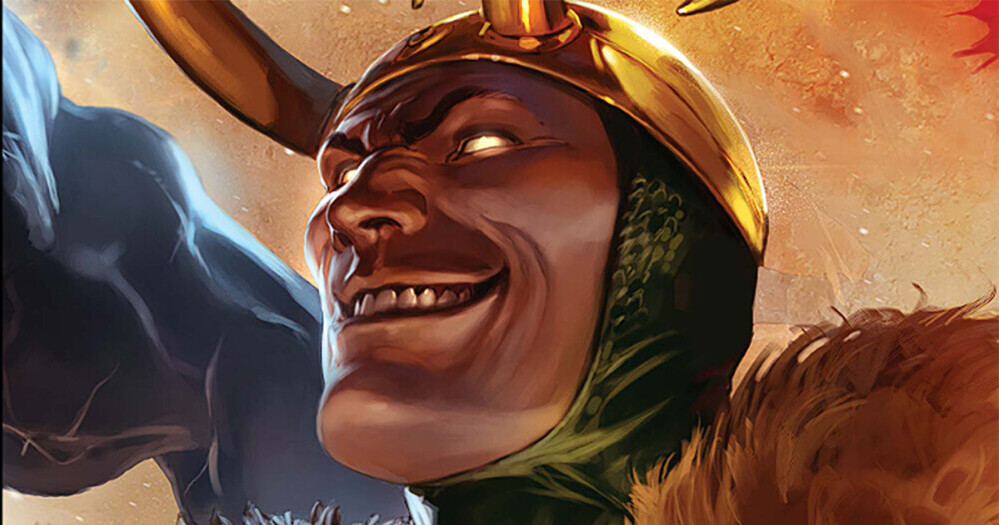
Hi Scott!
I’ve always found Loki’s journey through Marvel Comics to be one of the most fascinating character arcs. His ability to manipulate and outwit others, often without needing brute strength, really sets him apart. Even when his plans backfire, like when he accidentally forms the Avengers, it somehow works out in the grand scheme of things. I think that’s what makes Loki so interesting—he’s always several steps ahead, and even in failure, he leaves a lasting impact on the universe. Plus, you can’t help but admire his cleverness, even when he’s the villain!
One of my favorite things about Loki is how his character blurs the line between villain and anti-hero. Sometimes you find yourself rooting for him, especially when he’s going up against even bigger threats or outsmarting everyone around him. His schemes, like in Acts of Vengeance or when he swaps bodies with Thor, show just how far he’ll go to get what he wants—but there’s always that sense that he’s playing a much bigger game. What’s your favorite Loki scheme, and why do you think it stands out from the rest?
Hi macfais9!
Thanks for your thoughtful comment! I absolutely agree—Loki’s ability to manipulate without relying on brute force makes him stand out from other characters. His schemes often seem chaotic on the surface, yet they tie into a much larger narrative, like the accidental formation of the Avengers. I think that unpredictability is part of his charm—he’s always got some trick up his sleeve, even when things don’t go as planned.
The line between villain and anti-hero is really what makes Loki fascinating. One moment, he’s the villain we all love to hate, and the next, you’re rooting for him as he faces even bigger threats. His ability to blur those lines, while staying true to his trickster nature, keeps us all guessing.
As for my favorite Loki scheme, I’d have to go with Acts of Vengeance as well. His mastermind role behind the scenes, getting heroes to fight villains they aren’t used to, is a perfect example of how he uses intellect over sheer power. It’s not just about the immediate outcome for Loki—he’s always thinking ahead, playing a game that no one else even realizes is happening until it’s too late. That long game is what makes him such a brilliant character.
What do you think it is about Loki that allows him to fail spectacularly, yet still come out on top?
Scott
This article provides a fascinating look at Loki’s most cunning schemes and deceptions! His character always adds an unpredictable dynamic to any storyline. I wonder, from a storytelling perspective, how do you think Loki’s motivations differ between different mythologies and modern adaptations like the Marvel universe? It’s interesting to see how his character has evolved over time while staying true to his trickster roots. I’d also love to hear your thoughts on how his more humorous or chaotic nature influences the development of other characters around him. It’s always great to see how a well-crafted antagonist like Loki can shape a narrative!
Thank you so much for your thoughtful comment! Loki’s character truly does add an unpredictable and exciting dynamic to any story, and it’s fascinating to explore how his motivations evolve across mythologies and modern adaptations. In Norse mythology, Loki’s motivations often stem from a chaotic desire to disrupt the status quo. He’s less concerned with morality and more with challenging the gods, sometimes for personal gain, sometimes just to see what happens. This chaotic neutrality reflects his role as the trickster god—neither fully good nor evil.
In contrast, Marvel’s Loki, especially in recent comics and the MCU, has more complex and layered motivations. While his trickster nature remains, we see deeper emotional drives, like his constant desire for validation and power, often fueled by his insecurities about being adopted and living in Thor’s shadow. This gives him a more relatable, almost tragic dimension, even as he schemes and deceives those around him.
Regarding his influence on other characters, Loki’s chaotic and humorous nature often forces those around him to adapt, making them more resilient or forcing them to confront their own values. Thor, in particular, grows as a character by repeatedly facing Loki’s deceptions. Their relationship is a mix of love, rivalry, and betrayal, and it’s through Loki’s constant mischief that Thor matures, becoming more introspective and capable of leading Asgard.
Thanks again for sharing your thoughts! Let me know if there are any other aspects of Loki you’d like to explore!
Hi Scott,
The article explores Loki’s intricate character as a trickster and manipulator in the Marvel Universe, detailing some of his most cunning schemes that showcase his cleverness over brute strength. It highlights how his actions, whether intentional or not, have far-reaching consequences, such as the creation of the Avengers from his plot to defeat Thor.
The piece emphasizes the complex rivalry between Loki and Thor, underscoring themes of jealousy and unexpected bonds formed through deception, ultimately providing a thorough and engaging look at Loki’s influential role in Marvel Comics.
I particularly enjoyed the discussion on how Loki’s actions—whether intentional or not—have far-reaching consequences, such as the creation of the Avengers from his initial plan to defeat Thor. It’s a brilliant reminder that even a villain’s failures can lead to significant developments in the overarching narrative.
Hi John,
Thank you for your comment! I’m glad you enjoyed the article.
– Scott
Wow, what a beautifully written and comprehensive deep dive into Loki’s fascinating evolution in the Marvel Universe! Your analysis truly captures the essence of Loki’s character — his schemes, manipulations, and the complexity that makes him so compelling. I particularly loved how you highlighted the psychological intricacies behind his actions, from his covert manipulation in Acts of Vengeance to his moment of self-sacrifice during Siege. It’s refreshing to see Loki portrayed not just as a villain, but as a multi-layered figure, constantly dancing between power, vulnerability, and a thirst for something more.
Your breakdown of his transformation in Journey Into Mystery as Kid Loki is especially moving. It’s a testament to how nuanced and emotionally rich Loki’s character has become over the years. This post provides a fantastic exploration of the larger themes of identity, redemption, and the never-ending battle between good and evil within him.
Thank you for shedding light on so many iconic moments and connecting them so thoughtfully! You’ve given readers a lot to ponder and appreciate about Loki’s legacy. Truly a must-read for any Marvel fan!
Hi Scot!
Thank you so much for your kind words! I’m thrilled that you enjoyed the deep dive into Loki’s evolution and appreciated the layers of complexity that make him such a fascinating character in the Marvel Universe. Loki’s journey from villain to a more nuanced figure—full of vulnerabilities and contradictions—offers so much to explore, and I’m glad the post resonated with you.
I agree, Loki’s arc in Journey Into Mystery as Kid Loki is especially powerful. It’s such a striking moment in his transformation, showcasing his struggle for redemption while still grappling with his own nature. I’m glad you found that part moving—it’s one of my favorites as well!
It’s readers like you who make writing these posts so rewarding, and your thoughtful reflections remind me just how rich Marvel’s storytelling can be. Thanks again for reading and sharing your insights! Feel free to share the post with any fellow Loki fans, and I’d love to hear more of your thoughts on any other Marvel characters you find equally compelling.
– Scott
Hey Scott,
Hope you’re doing well! I just finished reading your fantastic article on “The Trickster God: Loki’s Best Schemes And Deceptions” and, wow, I have to say it was a riveting dive into one of Marvel’s most complex characters. As a huge comic book fan myself, your detailed exploration of Loki’s antics really resonated with me. His blend of mischief and depth makes him a standout in the Marvel Universe, don’t you think?
One of the aspects I particularly enjoyed was how you highlighted Loki’s role in the formation of the Avengers. It’s fascinating how his deceptive plan, intended to trap Thor, inadvertently led to the creation of one of the most iconic superhero teams in comic book history. It’s a testament to Loki’s influence that even his failures can have monumental consequences.
I also admired your discussion on the “Acts of Vengeance” crossover. Loki’s ability to manipulate a vast array of supervillains against unfamiliar heroes showcases his strategic genius and deep understanding of psychological warfare. It’s remarkable how he manages to orchestrate such chaos, proving that true power can lie in the art of manipulation rather than brute strength.
On that note, I’m curious about your thoughts on Loki’s evolution from pure villainy to a more anti-heroic figure, especially in more recent storylines like “Siege” and his stint as Kid Loki. How do you think this affects the perception of his character both as a villain and as a potential anti-hero in the eyes of Marvel fans?
Also, if you’re up for a bit of fun debate, who do you think would win in a battle of wits between Loki and Doctor Doom? Both are master manipulators, but there’s always that element of unpredictability with Loki that makes it a captivating matchup.
Thanks for sharing such an engaging piece on the god of mischief. Looking forward to your thoughts and perhaps some more insider info on Loki’s future in the Marvel Universe!
All the Best,
Eric
Hey Eric,
Thanks for your thoughtful and insightful comment! I’m glad to hear that the article resonated with you—Loki’s complexity makes him such a fun character to dive into, and it’s great to connect with fellow fans who appreciate the nuance he brings to the Marvel Universe.
I totally agree with you about Loki’s unintended role in forming the Avengers. His manipulations often spiral in ways even he can’t foresee, and that makes his character so fascinating—he’s powerful, but chaos always finds a way to make things even more interesting. His failed attempt to trap Thor creating the Avengers is a prime example of how even his missteps are impactful. By the way, you may know that the comics version of the formation of the Avengers is totally different from the MCU. In the MCU, the Avengers was a S.H.I.E.L.D. initiative.
As for Acts of Vengeance, I think it’s one of Loki’s most underrated moments in terms of showing his brilliance., although I have read some fans and critics that were underwhelmed by the crossover event. Loki knows how to exploit weaknesses and turn the tide in his favor, even when facing far more powerful opponents. His ability to remain behind the scenes, pulling the strings of such a wide range of villains, is classic Loki. Like you said, his strategic genius is often more dangerous than brute force.
Loki’s evolution from villain to anti-hero is one of the most intriguing character arcs in Marvel, and it definitely challenges the way fans see him. In Siege and especially his time as Kid Loki, we get a glimpse of a more vulnerable side—a character who seeks redemption but can’t escape his nature. That tug-of-war between his mischievous tendencies and his desire for change adds so much depth. I think fans appreciate that complexity because it makes him relatable in a way that pure villains often aren’t. His unpredictability keeps us invested in his story.
Now, as for the battle of wits between Loki and Doctor Doom—that’s a tough one! Both are master manipulators with vastly different styles. Loki thrives on unpredictability and chaos, whereas Doom’s plans are precise and calculated. I’d say Loki might have the edge in a short-term game, especially if he can catch Doom off-guard. But Doom’s discipline and intellect could outlast Loki’s trickery in the long run. What do you think?
Thanks again for your kind words and engaging questions. Stay tuned for more posts—there’s always something brewing with the god of mischief!
Best,
Scott
Hey Scott, I really enjoyed this breakdown of Loki’s best schemes! The amount of imagination required to craft these stories is impressive—Loki’s tricks always keep you guessing, and it’s fascinating how he plays both villain and hero. His deception during the construction of Asgard’s walls is such a brilliant example of his wit and unpredictability. Can’t wait to read more of his mind-bending plans!
Hi!
Thank you, PiotN! I’m glad you enjoyed the breakdown of Loki’s schemes. You’re right—his unpredictability is one of his most fascinating traits, and the story of the construction of Asgard’s walls is such a perfect example of how Loki manipulates events for his own benefit (and often to the frustration of others!). His ability to walk the line between hero and villain keeps readers constantly on their toes. I’m excited to share more of his mind-bending schemes in future posts, so stay tuned!
– Scott
Such an engaging dive into Loki’s clever tricks and deceptions! It’s fascinating how his schemes are so multi-layered and often serve a purpose beyond mere mischief. This piece captures the essence of why Loki is such a compelling character – unpredictable yet oddly relatable. I especially enjoyed how each scheme reflects a different aspect of his cunning nature. Well done on showcasing the God of Mischief’s complex personality and ever-entertaining plots
Hi Mercy!
I’m glad you enjoyed the post and learning more about Loki’s tricks. It is certainly an interesting character from Marvel to write about!
I hope you come back for more superhero fun!
– Scott
Hello Scott!
What a fascinating dive into the character Loki. One thing that I find really quite interesting within the Marvel Universe is that so many artists and writers have the capability of keeping each characters essence while adding to the depth to the character as well, not that they take on “a version of the character” themselves but more rather adding to the complexity of the character already created. There were a couple details in there that were great to learn about Loki. I did not realize that Loki had come back as a child. I will definitely have to look into the comics after Siege to read that story, Loki as a mischievous child really sounds like alot of fun!
Hi Becky!
Thank you so much for your thoughtful comment! I’m glad you enjoyed the dive into Loki’s character. You’re absolutely right—one of the most incredible things about Marvel is how different writers and artists add layers to characters without losing their core essence. Loki is a great example of that, constantly evolving while still staying true to his mischievous nature.
Loki’s return as a child after Siege is definitely a fun and intriguing part of his journey! Kid Loki is a fascinating version of the character—he still has that trickster spirit, but there’s also a sense of innocence and even vulnerability that wasn’t there before. His arc in Journey Into Mystery is especially worth checking out if you’re interested. The way his mischievousness blends with an attempt at redemption makes for some really compelling storytelling.
I’d love to hear your thoughts once you’ve had a chance to explore that part of his story! Thanks again for stopping by and sharing your excitement!
Best,
Scott
Hello,
I like how in depth your article is written. This article highlights the evolution of Loki’s character in Marvel Comics, emphasizing his role as a master manipulator whose schemes impact not just Thor but the entire Marvel Universe. It successfully contrasts Loki’s cunning intellect with the brute force of other characters, showcasing how his deceptions often lead to unintended yet significant consequences, such as the creation of the Avengers. The analysis of Loki’s complex psyche and his unrelenting rivalry with Thor deepens our understanding of his motives.
Given Loki’s tendency to manipulate others for personal gain, do you believe his actions are more driven by his insecurities or a genuine desire for power?
Thanks for your thoughtful comment, Msamawi! I’m glad you enjoyed the in-depth exploration of Loki’s schemes and how his deceptions often have universe-altering consequences.
To your question about Loki’s motivations—whether they stem more from insecurity or a desire for power—I think it’s a blend of both. In many instances, Loki’s actions seem driven by deep-seated insecurities. His complicated relationship with Thor, his status as an adopted son, and his desire for validation within Asgard all play into his need to prove himself. These insecurities often fuel his schemes, as Loki constantly feels overshadowed and underestimated, especially when compared to Thor’s strength and honor.
At the same time, Loki clearly craves power. He’s a trickster, but not just for the sake of chaos; he manipulates situations to elevate his position, whether it’s ruling Asgard or shaping the fate of entire realms. His desire for power is often portrayed as a way to escape his feelings of inadequacy—if he can outsmart and overpower those around him, perhaps he’ll finally feel like he belongs or even surpass Thor.
Ultimately, I think Loki’s quest for power and his insecurities are two sides of the same coin, with his trickery and manipulations serving both his need for self-worth and his ambition. It’s what makes him such a layered and fascinating character!
What do you think? Does one motivation seem stronger to you? I’d love to hear your take!
– Scott
Thank you for this interesting look into the life and history of Loki. I didn’t know he had come such a long way since reading the comics in my youth. At that time I couldn’t decide if he was a good guy or a bad one, but now it is evident that everything is not always as it seems.
I am sure if anybody owns that 1962 comic, it must be worth a fortune by now.
Hi Michel!
I’m glad you enjoyed and learned some things about Loki! I have seen some sites that sell the old comic issue. There are bids for it for over $1K. I have a friend that bought a mint condition copy of Avengers #1 that was $2,000!
I hope you keep coming back for more superhero fun!
– Scott
This was such a fun read! Loki’s schemes are always so wild, and it’s cool how unpredictable he can be. His ability to fake his death or switch sides constantly keeps everyone guessing. Honestly, he’s one of those characters you can’t help but love despite all the chaos he causes. Loki’s definitely the ultimate trickster!
HI Randi,
Thank you so much for your comment and enthusiasm about the article. Loki is quite an interesting character!
Please come back for more superhero fun!
– Scott
I always learn something new from reading your blog posts about the Marvel characters. Discovering more about Loki and his villainous acts, is another great read. It is fascinating to see how Loki, while trying to lure Thor into a trap, inadvertently strengthened Thor’s alliances and also bolstered the good forces in Marvel.
Do you think Loki will ever accept Thor as his brother and stop plotting his demise? Or will Loki continue on his jealous path and hatred of Thor? Thank you.
Thank you and welcome back! I’m glad you enjoyed the post and found Loki’s schemes as intriguing as I do. It’s interesting how, despite his constant plotting, Loki’s actions often have unintended consequences that strengthen Thor and his allies.
As for whether Loki will ever fully accept Thor as his brother, it’s one of the key tensions in both the comics and the MCU. While Loki’s jealousy and resentment run deep, we’ve seen moments where he acts out of brotherly love, even if briefly. In the comics, Loki’s evolution from villain to anti-hero suggests that he’s more conflicted than purely hateful. His journey reflects a constant struggle between his ambition and his emotional ties to Thor.
I think Loki’s complex nature means he’ll always be torn. His schemes may never fully cease, but there could be moments where he comes to accept his brother—even if it’s just before plotting another trick! What do you think? Could Loki truly embrace his family, or would that be against his very nature?
– Scott
I didn’t know Loki first appeared in 1962! I thought he came later. That’s so cool! I love looking at the pictures in the comics, especially the Avengers, which I’ve known about for a long time. I still enjoy them and want comics to keep coming out! It’s neat to see how Loki went from being just a bad guy to a more interesting character. I like reading his stories and watching him change!
Thanks so much for your comment, AJ! I’m glad you found Loki’s early history as interesting as I do! Yes, Loki’s first appearance in Journey into Mystery #85 in 1962 really helped set the stage for many of the classic stories that followed, especially with the Avengers, like you mentioned. It’s great to hear you’re still enjoying the comics and seeing how Loki evolves over time. His journey from a pure villain to a more layered, complex character is one of the reasons he’s become such a fan favorite. I agree—it’s amazing to watch him change both in comics and on screen! Hopefully, there will be many more stories to come.
I hope you come back for more superhero fun!
– Scott
Loki’s mastery in manipulation and deception is truly fascinating, especially in how his schemes often backfire in unexpected ways. The fact that his trickery led to the creation of the Avengers shows just how unpredictable and impactful his actions are. I love how you’ve highlighted not just his cleverness, but also how his obsession with Thor has sometimes been his downfall. Loki’s complexity as a character keeps the readers hooked whether he’s causing chaos or inadvertently helping the heroes. Fantastic breakdown of his schemes!
Thank you for your thoughtful comment, Kavitha! I completely agree—Loki’s ability to weave manipulation and deception into his plans makes him such a captivating character. His schemes indeed have a way of backfiring spectacularly, often leading to unexpected outcomes, like the formation of the Avengers! I love exploring how his complicated relationship with Thor both drives his actions and sometimes leads to his downfall. Loki’s complexity adds so much depth to the stories, making it thrilling to see how he navigates his chaotic role in the Marvel Universe. I appreciate your feedback, and I’m glad you enjoyed the breakdown of his schemes!
Keep coming back for more superhero fun and please share with your friends!
– Scott
This was such a fun read! Loki’s ability to manipulate situations and characters, not just in Asgard but across the Marvel Universe, is always fascinating. His schemes may not always go as planned, but the ripple effects of his actions are what make him such a compelling character. It’s incredible how even his failures, like accidentally creating the Avengers, have shaped the entire Marvel landscape.
Thank you, Maksim! I’m glad you enjoyed the post. I completely agree—Loki’s schemes, even when they fail, often end up having a profound impact on the Marvel Universe. His accidental creation of the Avengers is a perfect example of how his actions ripple far beyond his intentions. That’s what makes him such a fascinating character—whether he’s plotting in Asgard or pulling strings across the cosmos, you never quite know how things will unfold. His mix of cunning and unpredictability keeps us all on our toes! Thanks for sharing your thoughts. Feel free to let me know what your favorite Loki scheme is!
– Scott
Loki’s manipulations and tricks are really on point! He’s a very skilled and his schemes are almost very successful. Fortunately, these schemes are meant to be obstacles for the heroes to be winded. Because without high obstacles, and good villains, you can’t have heroic attitude. My favorite are those which allow you to deeper in Loki’s psyche because I’m always interested in the psychological aspect of how you become a villain.
Thanks for your thoughtful comment, angelce903! You’re absolutely right—Loki’s schemes are often brilliantly crafted, and it’s his ability to pose such significant challenges that elevates the heroes as well. The psychological depth behind his actions is one of the things that makes Loki such a compelling character. His journey from villain to anti-hero shows just how complex his motivations can be, and it’s fascinating to see how his experiences shape his identity.
If you’re particularly interested in the psychology behind Loki’s villainy, you might enjoy diving into his early days in the comics, where we see how his feelings of abandonment and jealousy drive him. What do you think about the way the MCU has portrayed this aspect of his character compared to the comics?
Thanks again for sharing your thoughts! Would love to hear more about your favorite Loki stories.
– Scott
Loved this breakdown of Loki’s best schemes! As a fan of the Trickster God, it’s always so fun to see just how clever (and mischievous) he can be. I think his plan to take over Asgard in Thor: Ragnarok might be my favorite—it was so brilliantly executed and full of unexpected twists. Do you think any of Loki’s schemes were actually justified, or was he just always out for himself? Would love to hear other fans’ takes on this!
Thanks, Amira! I’m glad you enjoyed the breakdown of Loki’s best schemes. His plan to take over Asgard in Thor: Ragnarok was indeed brilliantly executed—Loki at his finest! The twists and turns kept everyone guessing, which is what makes him such an engaging character.
As for whether any of his schemes were justified, that’s a great question. Loki often operates from a place of feeling like an outsider, which might justify some of his actions in his own mind—he’s looking for validation, power, and a sense of belonging. But at the same time, he’s definitely out for himself more often than not, seeking to satisfy his ambition. I think that complexity is what makes him so fascinating to watch and read about. I’d love to hear other fans’ thoughts on this too—Loki’s motivations are always up for debate! What do the rest of you think?
Come back again soon for more superhero fun!
– Scott
I know about Loki from watching the Avengers movies. Loki even though is a villain, left me a deep impression. The reason is because there are times in the movies where Loki helps Thor or the Avengers. Because of these parts in the movie, my impression of Loki is rather a mixed one as in I do not think that he is completely bad. Just like what the article mentioned, he turned bad because he was jealous of Thor, which is really such a pity as Loki is smart just like what the article mentioned. It will be great if he can join the Avengers . I am sure the Avengers will definitely gain a lot from his intelligence.
Hi Lynz,
Thank you so much for your thoughtful comment! I completely agree with your perspective on Loki. While he’s often seen as a villain, his complex relationship with Thor and the Avengers makes him a much deeper character than a straightforward antagonist. Those moments where he helps Thor or even the Avengers show that he’s not purely evil—he’s driven by jealousy and a desire for recognition, which makes him more relatable in many ways.
It’s interesting you mention the possibility of Loki joining the Avengers! There have been times in the comics where Loki does work alongside the Avengers, such as in the War of the Realms storyline. And in his younger, reincarnated form as “Kid Loki,” he even became a member of the Young Avengers. His intelligence and cunning would definitely bring a unique edge to the team, and it’s fascinating to think how much more they could achieve with him as an ally.
Thanks again for reading and sharing your thoughts! I’d love to hear more about which of Loki’s moments in the MCU stood out to you.
– Scott
Hello Scott,
What a fascinating exploration of Loki’s character! Your analysis brilliantly highlights how his cleverness and manipulation shape not only his own story arc but also the broader Marvel Universe. I love how you detail his first appearance in Journey into Mystery #85, showcasing his evolution from a villain motivated by jealousy to a master manipulator who creates chaos through others.
I also appreciate the depth you bring to Loki’s rivalry with Thor, especially in Thor #179. The body swap concept is such a clever twist that really illustrates Loki’s desperation for respect and power while simultaneously showing the strength of Thor’s heroism. This dynamic adds so much richness to their relationship and further complicates Loki’s character.
Overall, this post does a fantastic job of capturing Loki’s complexity as a character who is both a villain and an anti-hero. I am excited to see where you take this analysis next.
Thank you so much, Starlight! I’m thrilled that you enjoyed the post and found the exploration of Loki’s character as fascinating as I do. His evolution from a jealous villain to a master manipulator has always been one of the most compelling arcs in Marvel, especially with how it impacts not just his story but the entire universe, as you mentioned.
The body swap with Thor in Thor #179 is indeed one of those classic Loki schemes that perfectly captures his desperation for power and respect. It’s fascinating how even with all of his cleverness, Loki’s plans often reveal his vulnerabilities, especially in his rivalry with Thor, whose strength and heroism make for such a perfect contrast.
I’m excited to dive even deeper into Loki’s character in future posts! There are so many more schemes and layers to explore, particularly how Loki’s actions influence events beyond his own personal battles. I hope you’ll join me as we continue unraveling the mysteries of the Trickster God!
Thanks again for your thoughtful comment, and feel free to share your favorite Loki moments too—I’d love to hear them!
– Scott
This is an incredibly detailed and fascinating exploration of Loki’s greatest schemes, Scott! You’ve done a great job highlighting how Loki’s manipulations and deceptions shape not only his character arc but the Marvel Universe as a whole. The way he’s portrayed as a trickster with complex motives—sometimes villain, sometimes anti-hero—makes him one of Marvel’s most compelling figures.
A few questions came to mind as I was reading, and I’d love to hear your thoughts:
Loki’s Intentions: Loki’s deceptions are always so multi-layered. Do you think there’s ever been a moment in the comics where Loki was genuinely trying to help someone or act selflessly, or is there always an underlying personal motive? For example, his sacrifice in Siege—was that pure redemption or another manipulation?
Loki and Power: Loki often seems to be motivated by his need for recognition and power, as seen in the Sorcerer Supreme storyline. Do you think Loki’s thirst for power is born out of a genuine belief that he could wield it better than others, or is it simply a way to overcome his insecurities and inferiority complex, especially in relation to Thor?
Thor and Loki’s Relationship: Their rivalry is at the core of many of Loki’s schemes. Do you believe Loki’s obsession with Thor is more about jealousy of Thor’s status and power, or is it more about Loki’s desire for acceptance and recognition from his family and peers? How does this shape their dynamic throughout the comics?
The Role of Manipulation: Loki’s schemes often involve manipulating others to do his bidding (like the formation of the Avengers). How much of his success is due to his intelligence and tactical mind, versus the failures or weaknesses of those around him? Do you think Loki is actually as powerful as he thinks he is, or is his true skill in using others as pawns?
Loki as an Anti-Hero: Throughout the comics, Loki walks a fine line between villain and anti-hero. In your opinion, which side do you think he leans toward more? Could he ever truly be redeemed, or will his trickster nature always keep him on the edge of chaos?
Impact of Loki’s Failures: Even when Loki’s schemes fail, they often have lasting consequences (like the creation of the Avengers). Do you think Loki’s failures are just as important to his character development as his successes? How do these setbacks contribute to his evolution in both the comics and the MCU?
Overall, I love how you’ve broken down Loki’s schemes through different eras of Marvel Comics. His constant evolution and complex character make him stand out as more than just a villain. What’s your personal favorite Loki scheme from the comics, and why?
Thank you so much, Raymond, for your thoughtful and engaging comment! I’m thrilled that you enjoyed my deep dive into Loki’s schemes and deceptions—he truly is one of Marvel’s most complex and multifaceted characters, and it’s always exciting to explore the layers that make him more than just a traditional villain.
To address your questions:
Loki’s Intentions:
Loki’s actions are often cloaked in manipulation, so it’s hard to say if he’s ever truly acting selflessly. However, there are moments where he seems to seek redemption, such as his sacrifice in Siege. That moment can be interpreted as genuine, since Loki effectively gives up his life to undo the damage caused by his past schemes. But as always with Loki, it’s worth questioning whether even that act came with some personal motive or a desire to control the narrative of his redemption. Perhaps, in his mind, sacrificing himself was just another way to secure power through martyrdom. So, while I believe there was a genuine desire for redemption, Loki likely wouldn’t be Loki without some element of self-interest.
Loki and Power:
Loki’s thirst for power definitely stems from his insecurities, especially when compared to Thor. The Sorcerer Supreme storyline is a great example of this—Loki doesn’t just want power for its own sake; he wants the recognition and validation that comes with it. He’s constantly trying to prove that he’s better than Thor, Odin, or anyone else who ever doubted him. At times, it feels like Loki genuinely believes he could rule or wield power more effectively than others, but his actions are often sabotaged by his internal struggles. That insecurity is a driving force behind many of his schemes.
Thor and Loki’s Relationship:
Loki’s obsession with Thor is complex, and I believe it’s a mixture of both jealousy and a desire for acceptance. Loki constantly wrestles with his feelings of being the “outsider” in the family, and Thor represents everything he wishes he could be—strong, beloved, and naturally heroic. But at the same time, Loki deeply craves Thor’s approval and, on some level, wants to be accepted as an equal by both Thor and the rest of Asgard. Their dynamic evolves throughout the comics as Loki oscillates between hating and wanting to be close to his brother. This duality shapes much of their conflict.
The Role of Manipulation:
Loki’s intelligence and tactical mind are often his greatest strengths, and many of his successes stem from exploiting the weaknesses of those around him. I think Loki’s real power isn’t so much in raw strength but in his ability to manipulate others. He’s adept at reading people, understanding their desires and fears, and then bending them to his will. Even though Loki isn’t as powerful as Thor in traditional terms, he’s able to level the playing field through his manipulations, which is what makes him so dangerous.
Loki as an Anti-Hero:
Loki straddles the line between villain and anti-hero, and while he’s shown moments of growth, his trickster nature often pulls him back into chaos. I think his evolution toward being an anti-hero is genuine, but it’s always tenuous. Loki’s identity as a trickster makes it hard for him to fully embrace redemption—there will always be a part of him that thrives on chaos and deception. Whether he could ever truly be redeemed is an ongoing question, and perhaps that’s what makes him so compelling. He’s always walking the fine line between destruction and salvation.
Impact of Loki’s Failures:
Loki’s failures are, in many ways, just as important as his successes. As you mentioned, even when his schemes fail, they often lead to significant consequences, like the creation of the Avengers. These failures shape his character and force him to evolve, often making him more cunning and resilient. In both the comics and the MCU, we see Loki learning from his setbacks, adapting his strategies, and becoming more formidable as a result. His failures humanize him and contribute to his ongoing transformation.
Personal Favorite Loki Scheme:
It’s hard to pick a single favorite Loki scheme, but I’d have to go with Acts of Vengeance. In this storyline, Loki manipulates several of Marvel’s most dangerous villains into forming a secret alliance, all while concealing his own involvement. The brilliance of this scheme lies in its simplicity and scope—Loki convinces villains like Doctor Doom, the Kingpin, and Magneto to attack heroes they normally wouldn’t face, hoping that the unfamiliar matchups will lead to their downfall. It’s a masterclass in manipulation, as Loki stays behind the scenes, pulling the strings without any of the villains realizing they’re being used. This plot perfectly captures Loki’s cunning, his strategic brilliance, and his ability to influence events on a grand scale, making it one of my all-time favorites.
Thanks again for your comment and insightful questions, Raymond! I’d love to hear your thoughts on Loki’s potential for redemption—do you think he’ll ever be able to fully shake off his trickster persona? Feel free to share your favorite Loki schemes too!
Best,
Scott
I really enjoyed your article about Loki and his best schemes! It’s fascinating how you highlighted his dual nature as both a trickster and a complex character. I love the stories where his cleverness leads to unexpected twists. Which of Loki’s schemes do you think showcases his character the best? Do you have a favorite tale that stands out for you?
Hi John,
I’m glad you enjoyed my post about Loki’s schemes. He really is a master schemer! I think I like the Acts of Vengeance crossover the best. It’s incredible how Loki could control the minds of so many different villains and brought all the superheroes out to fight them.
I hope you come back for more superhero fun!
– Scott
Vikings! Love them. I come from a line of them – Norwegian/Irish. Is Loki the main manipulator in the Marvel pantheon, would you say? Your breadth of knowledge is impressive, so I’m sure you can answer that question. I’ve come relatively recently to love these epic comics, but you’ve been at it for years, so I bow to you!
I think these stories take me closer to the Cosmos, where I want to be. I wonder whether to plunge on Acts of Vengeance as my first hardback. Can you give me an idea of the price before I commit myself?
I love the way you write, Scott! It is always a pleasure to learn more about your heroes.
Hi Linden,
It’s great to hear from you again. It’s interesting to hear that you come from a line of Norwegians. I have a lot of Irish myself in my line, but I am not aware of any Norwegian background. Mostly English, Scottish, German and Dutch, I believe.
Loki is certainly one of the most cunning manipulators in the Marvel pantheon, often outsmarting heroes and villains alike with his schemes. While other characters, like Mystique or Doctor Doom, have their own devious plans, Loki’s blend of mischief, charm, and trickery sets him apart.
Acts of Vengeance would certainly be a lot of fun to read. You can get it in hardcover on Amazon for around $77 U.S. I am not sure what the price would be where you live. It was quite a crossover event and very exciting!
Thank you again for your support!
– Scott
I’ve always been intrigued by Loki’s character, especially the way he balances being both mischievous and complex. This breakdown of his best schemes really highlights why he’s such a fascinating figure in mythology. I’ve always felt a personal connection to Loki’s trickster nature—it makes me think about how life’s unpredictability can lead to some interesting lessons.
Do you have a favorite story of Loki’s that stands out to you the most? I’d love to hear more about any other lesser-known myths or deceptions he’s pulled off!
Angela M 🙂
Thank you, Angela, for your thoughtful comment! I’m glad you enjoyed the breakdown of Loki’s schemes and find him as fascinating as I do. You’re right—his ability to embody both mischief and depth makes him a truly compelling character.
As for a favorite story, I’d have to say Loki’s scheme in Acts of Vengeance stands out. The way he manipulated various villains to attack heroes they wouldn’t normally face was a masterclass in strategy and deception. On a more mythological side, there’s a lesser-known story where Loki transforms into a mare and ends up giving birth to an eight-legged horse named Sleipnir, who becomes Odin’s steed. It’s such a bizarre yet clever tale, showing how far Loki is willing to go to achieve his goals.
Please come back again for more superhero fun!
– Scott